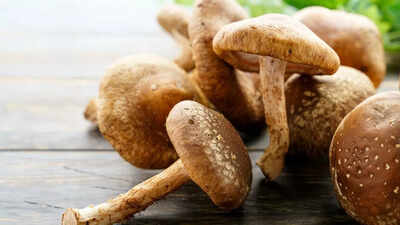The ongoing season of flu in the US is undoubtedly one of the worst-ever. The quad-demic of infections – Covid, influenza, RSV and norovirus are driving the hospital admissions like never before, overwhelming the healthcare system of the United States. As the influenza wave stretches on, building natural immunity and taking care of overall wellness can emerge as a strong defence against the viral infection.
Having a variety of colours on your plate and drinking lots of fluids is an effective strategy to guard against the viral infections. A new study discusses the potential of mushrooms in fighting influenza infections.
Mushrooms are already renowned for many health benefits from warding off cancer risk to boosting brain and heart health. Earlier studies also show the fungi can also cut depression risk. However, this new study demonstrates they can also shield against influenza.This protective effect is all thanks to the beta-glucan fibres found in all types of mushrooms that could act as a barrier against flu and cut inflammation in the lungs. Researchers from McGill University in Canada experimented on mice to unlock these wonderful properties of mushrooms, and published the findings in the Journal Nature Immunology.
Beta-glucans are soluble fibres that come from the cell walls of bacteria, fungi, yeasts, and some plants.

Improvement in lung function, reduction in risk of death
Beta-glucans helped boost lung function in mice and lowered risk of serious disease when infected with the flu.
Researchers are now looking forward to human trials which will help tell more, but for now this finding seem interesting enough.
What the researchers are saying
“Beta-glucan is found in the cell walls of all fungi, including some that live in and on our bodies as part of the human microbiome,” says Maziar Divangahi, immunologist at McGill University.
“It is tempting to hypothesize that the levels and composition of fungi in an individual could influence how their immune system responds to infections, in part because of beta-glucan.”
How beta-glucan help prevent oar cope with flu
Beta-glucans already have a good reputation among health enthusiasts and experts often recommend it to people for lowering the risk for heart disease. From preventing the body from absorbing cholesterol to stimulating the immune system by increasing chemicals that prevent infections, these wonder fibres are even recommended by the US FDA. The organization allows products containing at least 750 mg of beta-glucans to have a health claim stating that they might reduce heart disease risk.
The researchers in this study aimed to understand its potential in terms of disease tolerance and how it could reduce the impact of the viral attack on the body.
The researchers found that beta-glucan to reprogram immune cells to better cope against the flu. It was discovered that treated mice had more immune cells called neutrophils, but they were behaving in a more controlled manner than normal.
How beta-glucan affected neutrophils
“Neutrophils are traditionally known for causing inflammation, but beta-glucan has the ability to shift their role to reduce it,” says immunologist Kim Tran, from McGill University.
It was found that neutrophils stuck around for up to a month which means that a treatment with beta-glucan could offer long-lasting protection.
“It is remarkable how beta-glucan can reprogram certain immune cells, such as neutrophils, to control excessive inflammation in the lung,” says immunologist Nargis Khan, who is now at the University of Calgary in Canada.
(Picture courtesy: iStock)






